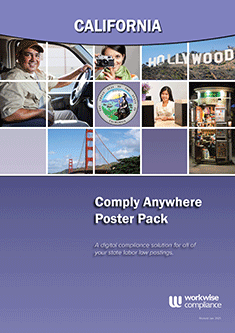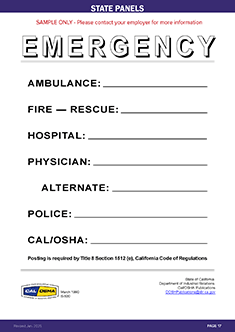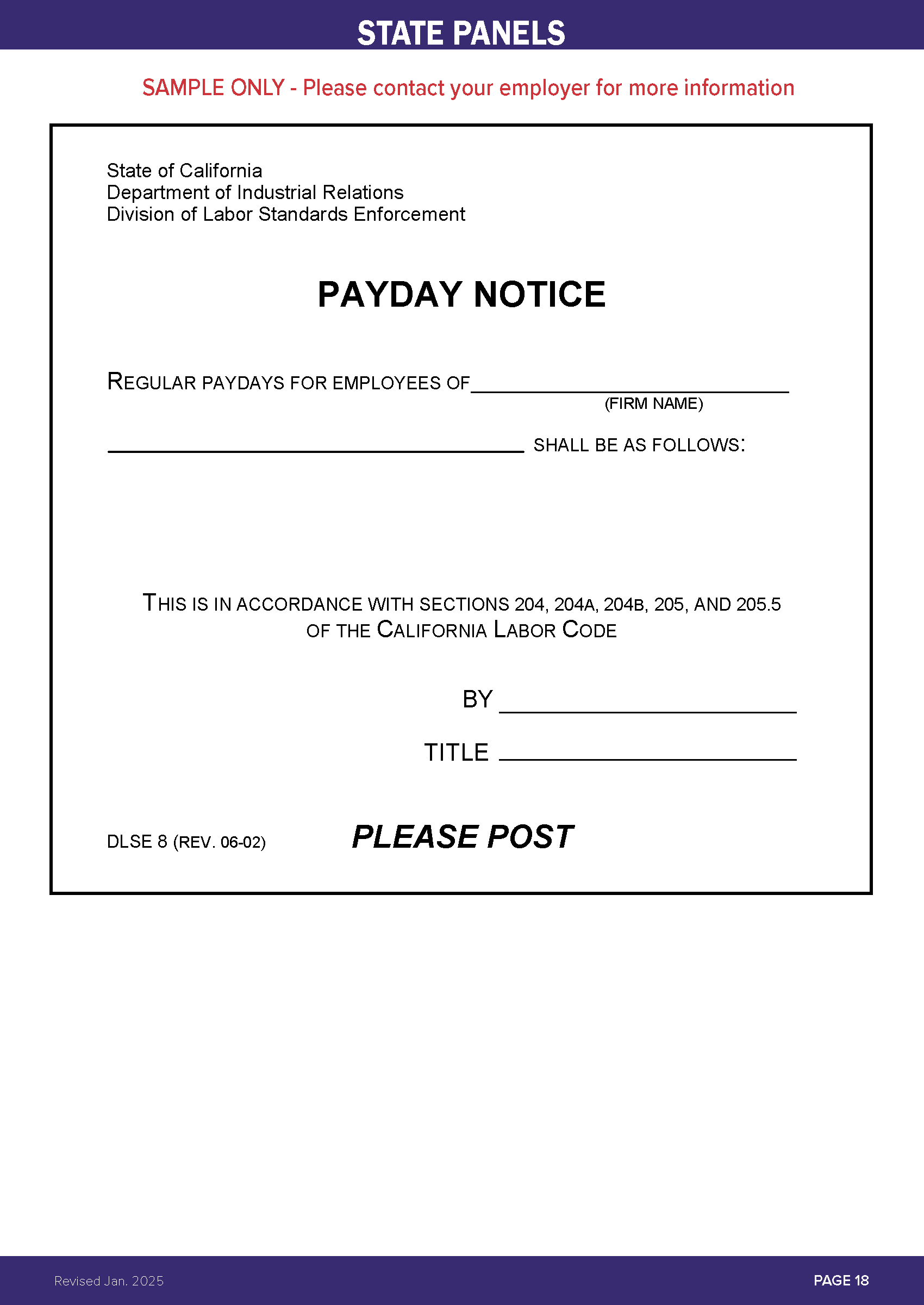Labor Compliance
Download Complete Labor Poster Pack
Employee Notice - Your Rights Are Protected
The Federal Government and the State of California have established laws and regulations that protect the rights of employees. As your employer, we are conspicuously posting the information that is required by the Federal Government and the State of California to better inform you of your rights as an employee of our company. If you should have any questions regarding these postings, please contact the personnel office or your immediate supervisor.
Note: The Comply Anywhere Poster (CAP) Pack is designed to provide accurate and authoritative information in regard to the subject matter covered. Businesses with one or more employees are required to comply with federal, state and/or local law notification and posting requirements. CAP will not satisfy all labor law posting and notification requirements that must be posted conspicuously in a location frequented by employees at a business. CAPs should be used only as a supplementary product when space is limited.
California Posters
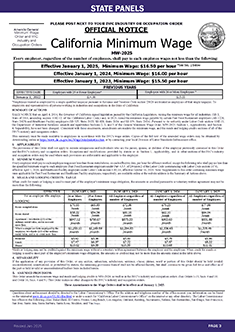
TAKE NOTICE that on April 4, 2016, the Governor of California signed legislation passed by the California Legislature, raising the minimum wage for all industries. (SB 3, Stats of 2016, amending section 1182.12. of the California Labor Code.) and, in 2023, raised the minimum wage payable by certain Fast Food Restaurant employers
(AB 1228, Stats. 2023) and Healthcare Facility employers (SB 525, Stats. 2023; SB
828, Stats. 2024; and SB 159, Stats. 2024). Pursuant to its authority under Labor Code section 1182.13, the Department of Industrial Relations amends and republishes Sections 2, 3, and 5 of the General Minimum Wage Order, MW-2025. Section 1, Applicability, and Section 4, Separability, have not been changed. Consistent with these enactments, amendments are made to the minimum wage, and the meals and lodging credits sections of all of the IWC's industry and occupation orders.
This summary must be made available to employees in accordance with the IWC's wage orders. Copies of the full text of the amended wage orders may be obtained by downloading online at https://www.dir.ca.gov/iwc/WageOrderIndustries.htm or by contacting your local Division of Labor Standards Enforcement office.
California Minimum Wage - English
Sueldo Mínimo de California - Spanish
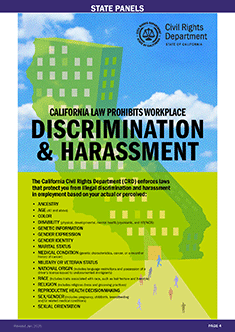 The California Civil Rights Department (CRD) enforces laws that protect you from
illegal discrimination and harassment in employment based on your actual or perceived:
Ancestry, Age(40 and above), Color, Disability (physical, developmental, mental health/psychiatric, HIV and AIDS), Genetic Information, Gender Expression, Gender Identity, Marital Status, Medical Condition (genetic characteristics, cancer, or a record or history of cancer), Military or Veteran Status, National Origin (includes language restrictions and possession of a driver's license issued to undocumented
immigrants), Race (includes hair texture and hairstyles), Religion (includes religious dress and grooming practices), Reproductive Health Decisionmaking, Sex/Gender (includes pregnancy, childbirth, breastfeeding and/or related medical conditions),
Sexual Orientation.
The California Civil Rights Department (CRD) enforces laws that protect you from
illegal discrimination and harassment in employment based on your actual or perceived:
Ancestry, Age(40 and above), Color, Disability (physical, developmental, mental health/psychiatric, HIV and AIDS), Genetic Information, Gender Expression, Gender Identity, Marital Status, Medical Condition (genetic characteristics, cancer, or a record or history of cancer), Military or Veteran Status, National Origin (includes language restrictions and possession of a driver's license issued to undocumented
immigrants), Race (includes hair texture and hairstyles), Religion (includes religious dress and grooming practices), Reproductive Health Decisionmaking, Sex/Gender (includes pregnancy, childbirth, breastfeeding and/or related medical conditions),
Sexual Orientation.
Discrimination & Harassment - English
Discriminacion y el Acoso - Spanish
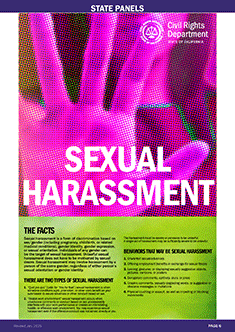
Sexual harassment is a form of discrimination based on sex/gender (including pregnancy,
childbirth, or related medical conditions), gender identity, gender expression, or
sexual orientation. Individuals of any gender can be the target of sexual harassment.
Unlawful sexual harassment does not have to be motivated by sexual desire. Sexual
harassment may involve harassment by a person of the same gender, regardless of either
person’s sexual orientation or gender identity.
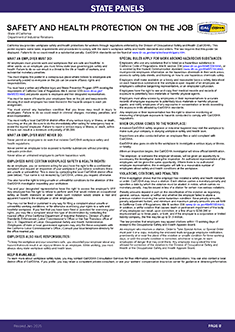
California law provides workplace safety and health protections for workers through
regulations enforced by the Division of Occupational Safety and Health (Cal/OSHA).
This poster explains some basic requirements and procedures to comply with the state’s
workplace safety and health standards and orders. The law requires that this poster
be displayed. Failure to do so could result in a substantial penalty. Cal/OSHA standards
can be found at www.dir.ca.gov/samples/search/query.htm
Cal/OSHA - English
Cal/OSHA - Spanish
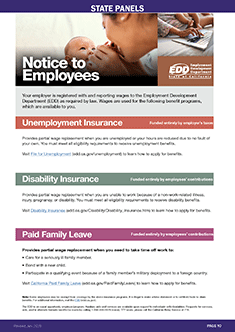
Your employer is registered with and reporting wages to the Employment Development
Department (EDD) as required by law. Wages are used for the following benefit programs,
which are available to you.
EDD Insurance - English
Seguro EDD - Spanish
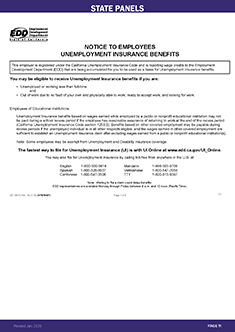
This employer is registered under the California Unemployment Insurance Code and is
reporting wage credits to the Employment
Development Department (EDD) that are being accumulated for you to be used as a basis
for Unemployment Insurance benefits.
Employees Unemployment Insurance Benefits - English
Beneficios Del Seguro De Desempleo Para Empleados - Spanish
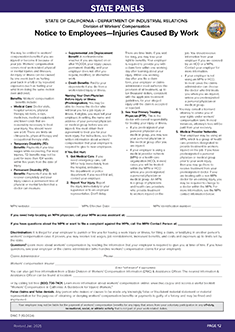
You may be entitled to workers’ compensation benefits if you are injured or become
ill because of your job. Workers’ compensation covers most work-related physical or
mental injuries and illnesses. An injury or illness can be caused by one event (such
as hurting your back in a fall) or by repeated exposures (such as hurting your wrist
from doing the same motion over and over).
Workers’ Compensation Notice - English
Aviso de Compensación de Trabajadores - Spanish
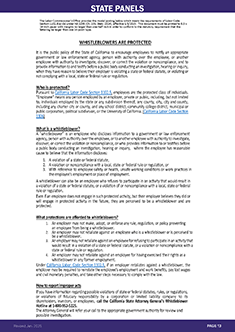
It is the public policy of the State of California to encourage employees to notify
an appropriate government or law enforcement agency, person with authority over the
employee, or another employee with authority to investigate, discover, or correct
the violation or noncompliance, and to provide information to and testify before a
public body conducting an investigation, hearing or inquiry, when they have reason
to believe their employer is violating a state or federal statute, or violating or
not complying with a local, state or federal rule or regulation.
Whistleblowers Protection - English
Protección de Denunciantes - Spanish
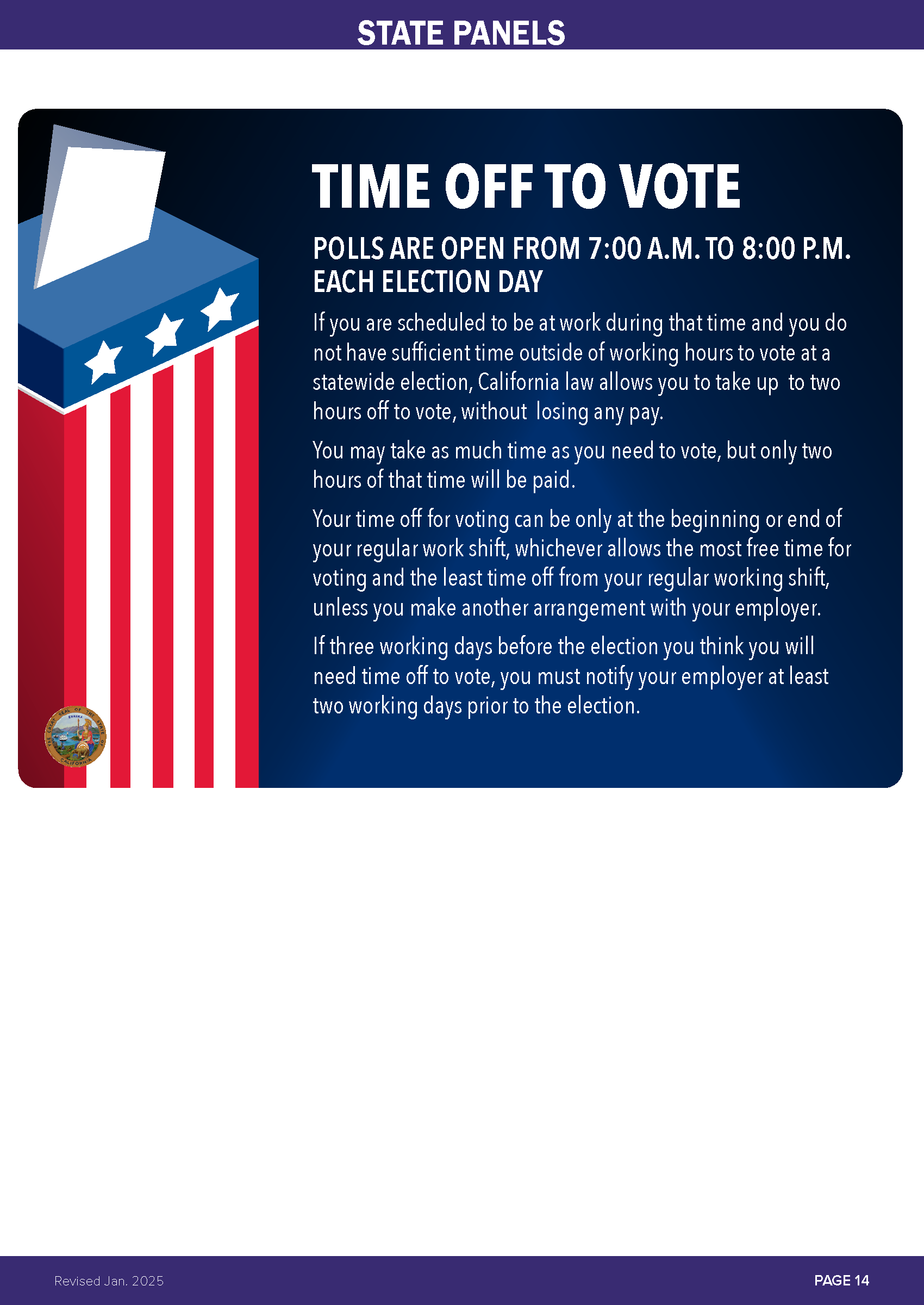
POLLS ARE OPEN FROM 7:00 A.M. TO 8:00 P.M.
EACH ELECTION DAY
If you are scheduled to be at work during that time and you do not have sufficient
time outside of working hours to vote at a statewide election, California law allows
you to take up to two hours off to vote, without losing any pay. You may take as much
time as you need to vote, but only two hours of that time will be paid. Your time
off for voting can be only at the beginning or end of your regular work shift, whichever
allows the most free time for voting and the least time off from your regular working
shift, unless you make another arrangement with your employer. If three working days
before the election you think you will need time off to vote, you must notify your
employer at least two working days prior to the election.
Right to Vote - English
Derecho a Votar - Spanish
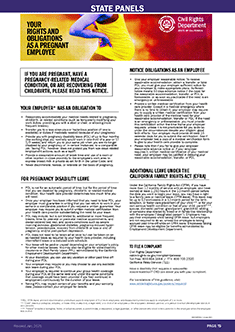
YOUR EMPLOYER* HAS AN OBLIGATION TO
• Reasonably accommodate your medical needs related to pregnancy, childbirth, or related
conditions (such as temporarily modifying your work duties, providing you with a stool
or chair, or allowing more frequent breaks);
• Transfer you to a less strenuous or hazardous position (if one is available) or
duties if medically needed because of your pregnancy;
• Provide you with pregnancy disability leave (PDL) of up to four months (the working
days you normally would work in one-third of a year or 17 1/3 weeks) and return you
to your same job when you are no longer disabled by your pregnancy or, in certain
instances, to a comparable job. Taking PDL, however, does not protect you from non-leave
related employment actions, such as a layoff;
• Provide a reasonable amount of break time and use of a room or other location in
close proximity to the employee’s work area to express breast milk in private as set
forth in the Labor Code; and
• Never discriminate, harass, or retaliate on the basis of pregnancy.
Your Rights and Obligations as a Pregnant Employee - English
Sus Derechos y Obligaciones Como Empleada Embarazada - Spanish
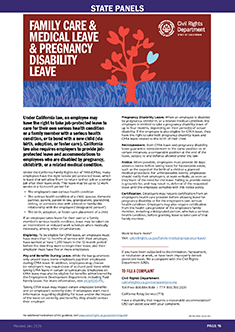
Under California law, an employee may have the right to take job-protected leave to
care for their own serious health condition or a family member with a serious health
condition, or to bond with a new child (via birth, adoption, or foster care). California
law also requires employers to provide jobprotected leave and accommodations to employees
who are disabled by pregnancy, childbirth, or a related medical condition.
Family Care, Medical Leave and Pregnancy Disability Leave - English
Licencia de Cuidado Familiar y Medica, y Licencia de Incapacidad por Embarazo - Spanish
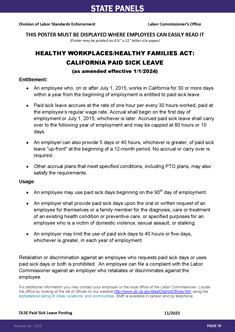
An employee who, on or after July 1, 2015, works in California for 30 or more days
within a year from the beginning of employment is entitled to paid sick leave.
• Paid sick leave accrues at the rate of one hour per every 30 hours worked, paid
at the employee’s regular wage rate. Accrual shall begin on the first day of employment
or July 1, 2015, whichever is later. Accrued paid sick leave shall carry over to the
following year of employment and may be capped at 80 hours or 10 days.
• An employer can also provide 5 days or 40 hours, whichever is greater, of paid sick
leave "up-front" at the beginning of a 12-month period. No accrual or carry over is
required.
• Other accrual plans that meet specified conditions, including PTO plans, may also
satisfy the requirements.
Paid Sick Leave - English
Licencia por Enfermedad Remunerada - Spanish
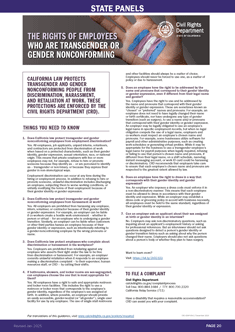
California law protects transgender and gender nonconforming people from discrimination,
harassment, and retaliation at work. These protections are enforced by the civil rights
department (CRD)
Transgender Rights in the Workplace - English
Los Derechos de Los Empleados Transgenero o de Genero no Conforme - Spanish

TAKE NOTICE that on April 4, 2016, the Governor of California signed legislation passed by the California Legislature, raising the minimum wage for all industries. (SB 3, Stats of 2016, amending section 1182.12. of the California Labor Code.) and, in 2023, raised the minimum wage payable by certain Fast Food Restaurant employers (AB 1228, Stats. 2023) and Healthcare Facility employers (SB 525, Stats. 2023; SB 828, Stats. 2024; and SB 159, Stats. 2024). Pursuant to its authority under Labor Code section 1182.13, the Department of Industrial Relations amends and republishes Sections 2, 3, and 5 of the General Minimum Wage Order, MW-2025. Section 1, Applicability, and Section 4, Separability, have not been changed. Consistent with these enactments, amendments are made to the minimum wage, and the meals and lodging credits sections of all of the IWC's industry and occupation orders.
This summary must be made available to employees in accordance with the IWC's wage orders. Copies of the full text of the amended wage orders may be obtained by downloading online at https://www.dir.ca.gov/iwc/WageOrderIndustries.htm or by contacting your local Division of Labor Standards Enforcement office.
California Minimum Wage - English
Sueldo Mínimo de California - Spanish
 The California Civil Rights Department (CRD) enforces laws that protect you from
illegal discrimination and harassment in employment based on your actual or perceived:
Ancestry, Age(40 and above), Color, Disability (physical, developmental, mental health/psychiatric, HIV and AIDS), Genetic Information, Gender Expression, Gender Identity, Marital Status, Medical Condition (genetic characteristics, cancer, or a record or history of cancer), Military or Veteran Status, National Origin (includes language restrictions and possession of a driver's license issued to undocumented
immigrants), Race (includes hair texture and hairstyles), Religion (includes religious dress and grooming practices), Reproductive Health Decisionmaking, Sex/Gender (includes pregnancy, childbirth, breastfeeding and/or related medical conditions),
Sexual Orientation.
The California Civil Rights Department (CRD) enforces laws that protect you from
illegal discrimination and harassment in employment based on your actual or perceived:
Ancestry, Age(40 and above), Color, Disability (physical, developmental, mental health/psychiatric, HIV and AIDS), Genetic Information, Gender Expression, Gender Identity, Marital Status, Medical Condition (genetic characteristics, cancer, or a record or history of cancer), Military or Veteran Status, National Origin (includes language restrictions and possession of a driver's license issued to undocumented
immigrants), Race (includes hair texture and hairstyles), Religion (includes religious dress and grooming practices), Reproductive Health Decisionmaking, Sex/Gender (includes pregnancy, childbirth, breastfeeding and/or related medical conditions),
Sexual Orientation.
Discrimination & Harassment - English
Discriminacion y el Acoso - Spanish

Sexual harassment is a form of discrimination based on sex/gender (including pregnancy,
childbirth, or related medical conditions), gender identity, gender expression, or
sexual orientation. Individuals of any gender can be the target of sexual harassment.
Unlawful sexual harassment does not have to be motivated by sexual desire. Sexual
harassment may involve harassment by a person of the same gender, regardless of either
person’s sexual orientation or gender identity.

California law provides workplace safety and health protections for workers through regulations enforced by the Division of Occupational Safety and Health (Cal/OSHA). This poster explains some basic requirements and procedures to comply with the state’s workplace safety and health standards and orders. The law requires that this poster be displayed. Failure to do so could result in a substantial penalty. Cal/OSHA standards can be found at www.dir.ca.gov/samples/search/query.htm
Cal/OSHA - English
Cal/OSHA - Spanish

Your employer is registered with and reporting wages to the Employment Development
Department (EDD) as required by law. Wages are used for the following benefit programs,
which are available to you.
EDD Insurance - English
Seguro EDD - Spanish

This employer is registered under the California Unemployment Insurance Code and is reporting wage credits to the Employment
Development Department (EDD) that are being accumulated for you to be used as a basis
for Unemployment Insurance benefits.
Employees Unemployment Insurance Benefits - English
Beneficios Del Seguro De Desempleo Para Empleados - Spanish

You may be entitled to workers’ compensation benefits if you are injured or become
ill because of your job. Workers’ compensation covers most work-related physical or
mental injuries and illnesses. An injury or illness can be caused by one event (such
as hurting your back in a fall) or by repeated exposures (such as hurting your wrist
from doing the same motion over and over).
Workers’ Compensation Notice - English
Aviso de Compensación de Trabajadores - Spanish

It is the public policy of the State of California to encourage employees to notify an appropriate government or law enforcement agency, person with authority over the employee, or another employee with authority to investigate, discover, or correct the violation or noncompliance, and to provide information to and testify before a public body conducting an investigation, hearing or inquiry, when they have reason to believe their employer is violating a state or federal statute, or violating or not complying with a local, state or federal rule or regulation.
Whistleblowers Protection - English
Protección de Denunciantes - Spanish

POLLS ARE OPEN FROM 7:00 A.M. TO 8:00 P.M.
EACH ELECTION DAY
If you are scheduled to be at work during that time and you do not have sufficient time outside of working hours to vote at a statewide election, California law allows you to take up to two hours off to vote, without losing any pay. You may take as much time as you need to vote, but only two hours of that time will be paid. Your time off for voting can be only at the beginning or end of your regular work shift, whichever allows the most free time for voting and the least time off from your regular working shift, unless you make another arrangement with your employer. If three working days before the election you think you will need time off to vote, you must notify your employer at least two working days prior to the election.
Right to Vote - English
Derecho a Votar - Spanish

YOUR EMPLOYER* HAS AN OBLIGATION TO
• Reasonably accommodate your medical needs related to pregnancy, childbirth, or related conditions (such as temporarily modifying your work duties, providing you with a stool or chair, or allowing more frequent breaks);
• Transfer you to a less strenuous or hazardous position (if one is available) or duties if medically needed because of your pregnancy;
• Provide you with pregnancy disability leave (PDL) of up to four months (the working days you normally would work in one-third of a year or 17 1/3 weeks) and return you to your same job when you are no longer disabled by your pregnancy or, in certain instances, to a comparable job. Taking PDL, however, does not protect you from non-leave related employment actions, such as a layoff;
• Provide a reasonable amount of break time and use of a room or other location in close proximity to the employee’s work area to express breast milk in private as set forth in the Labor Code; and
• Never discriminate, harass, or retaliate on the basis of pregnancy.
Your Rights and Obligations as a Pregnant Employee - English
Sus Derechos y Obligaciones Como Empleada Embarazada - Spanish

Under California law, an employee may have the right to take job-protected leave to care for their own serious health condition or a family member with a serious health condition, or to bond with a new child (via birth, adoption, or foster care). California law also requires employers to provide jobprotected leave and accommodations to employees who are disabled by pregnancy, childbirth, or a related medical condition.
Family Care, Medical Leave and Pregnancy Disability Leave - English
Licencia de Cuidado Familiar y Medica, y Licencia de Incapacidad por Embarazo - Spanish

An employee who, on or after July 1, 2015, works in California for 30 or more days
within a year from the beginning of employment is entitled to paid sick leave.
• Paid sick leave accrues at the rate of one hour per every 30 hours worked, paid at the employee’s regular wage rate. Accrual shall begin on the first day of employment or July 1, 2015, whichever is later. Accrued paid sick leave shall carry over to the following year of employment and may be capped at 80 hours or 10 days.
• An employer can also provide 5 days or 40 hours, whichever is greater, of paid sick leave "up-front" at the beginning of a 12-month period. No accrual or carry over is required.
• Other accrual plans that meet specified conditions, including PTO plans, may also satisfy the requirements.
Paid Sick Leave - English
Licencia por Enfermedad Remunerada - Spanish

California law protects transgender and gender nonconforming people from discrimination, harassment, and retaliation at work. These protections are enforced by the civil rights department (CRD)
Transgender Rights in the Workplace - English
Los Derechos de Los Empleados Transgenero o de Genero no Conforme - Spanish
California Conditional Notices
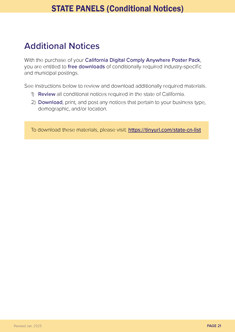
With the purchase of your California Digital Comply Anywhere Poster Pack, you are entitled to free downloads of conditionally required industry-specific and municipal postings.
See instructions below to review and download additionally required materials.
1) Review all conditional notices required in the state of California.
2) Download, print, and post any notices that pertain to your business type,
demographic, and/or location.
To download these materials, please visit: https://tinyurl.com/state-cn-list
 Download Additional Notice's Section
Download Additional Notice's Section

With the purchase of your California Digital Comply Anywhere Poster Pack, you are entitled to free downloads of conditionally required industry-specific and municipal postings.
See instructions below to review and download additionally required materials.
1) Review all conditional notices required in the state of California.
2) Download, print, and post any notices that pertain to your business type,
demographic, and/or location.
To download these materials, please visit: https://tinyurl.com/state-cn-list
 Download Additional Notice's Section
Download Additional Notice's Section


